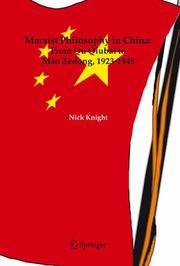| Listing 1 - 2 of 2 |
Sort by
|

ISBN: 1280427108 9786610427109 1402038062 1402038054 9048169704 Year: 2005 Publisher: Dordrecht : Springer,
Abstract | Keywords | Export | Availability | Bookmark
 Loading...
Loading...Choose an application
- Reference Manager
- EndNote
- RefWorks (Direct export to RefWorks)
This book examines the introduction of Marxist philosophy to China from the early 1920s to the mid 1940s. It does this through an examination of the philosophical activities and writings of four Chinese Marxist philosophers central to this process. These are Qu Qiubai, Ai Siqi, Li Da and Mao Zedong. The book sets the philosophical writings of these philosophers in the context of the development of Marxist philosophy internationally, and examines particularly the influence on these philosophers of Soviet Marxist philosophy. It argues that these Chinese Marxist philosophers’ interpretations of Marxist philosophy were quite orthodox when judged by the standards of contemporary Soviet Marxism. The book explores core themes in Marxist philosophy in China, including the dilemma of determinism, and investigates the way in which these Chinese Marxist philosophers sought a formula for the ‘Sinification’ of Marxist philosophy that both retained the universal dimensions of Marxism and allowed its application to the Chinese context. The book concludes with analysis of the role of the Yanan New Philosophy Association in developing from Soviet Marxist philosophy the philosophical dimension of Mao Zedong Thought, the official ideology of the Chinese Communist Party after 1945.
Philosophy, Marxist --- Philosophy, Modern --- History. --- Modern philosophy --- Marxian philosophy --- Marxist philosophy --- Communism and philosophy --- Philosophy, Asian. --- Philosophy (General). --- Non-Western Philosophy. --- Philosophy, general. --- History of Philosophy. --- Asian philosophy --- Oriental philosophy --- Philosophy, Oriental --- Philosophy. --- Mental philosophy --- Humanities

ISBN: 1402034865 9781402034862 9048168813 9786610460120 1280460121 1402034873 Year: 2005 Volume: 190. Publisher: Dordrecht: Springer,
Abstract | Keywords | Export | Availability | Bookmark
 Loading...
Loading...Choose an application
- Reference Manager
- EndNote
- RefWorks (Direct export to RefWorks)
The author undertakes an investigation into the history of Russian Freemasonry that has not been attempted previously. Her premise is that the Russian Enlightenment shows peculiar features, which prevent the application of the interpretative framework commonly used for the history of western thought. The author deals with the development of early Russian masonry, the formation of the Novikov circle in Moscow, the ‘programme’ of Rosicrucianism and the character of its Russian variant and, finally, the clash between the Rosicrucians and the State. The author concludes that the defenders of the Ancien Régime were not wrong. In fact the democratic behaviour, the critical attitude, the practice of participation, the freedom of thought, the tolerance for the diversity, the search for a direct communication with the divinity, in short all the attitudes and behaviours first practiced inside the eighteenth century Rosicrucian lodges constituted a cultural experience which spread throughout the entire society. Novikov’s imprisonment in 1792 and the war against the Rosicrucian literature were attempts to thwart a culture, based on the independence of thought that was taking root inside the very establishment, representing a menace to its stability.
Freemasonry --- Rosicrucians --- Enlightenment --- Franc-maçonnerie --- Rose-Croix --- Siècle des lumières --- History --- Histoire --- Novikov, Nikolai Ivanovich, --- Freemasons --- Russia --- Russie --- Enlightenment -- Russia. --- Freemasonry -- Russia -- History -- 18th century. --- Freemasons -- Russia -- History -- 18th century. --- Novikov, Nikolai Ivanovich, -- 1744-1818. --- Societies & Clubs --- Philosophy --- Sociology & Social History --- Philosophy & Religion --- Social Sciences --- Novikov, Nikolaĭ Ivanovich, --- Franc-maçonnerie --- Siècle des lumières --- EPUB-LIV-FT LIVPHILO SPRINGER-B --- Rosaecrucians --- Masonic orders --- Masonry (Secret order) --- Novikov, N. --- Novikov, Nicolas, --- Novikov, Nikolay, --- Новиков, Николай Иванович, --- Novikov, N. I. --- A.F. & A.M. --- A.L.A.M. --- AF and AM --- ALAM (Secret order) --- Ancient Free and Accepted Masons --- Antichi liberi accettati muratori --- F. & A.M. --- F. and A.M. --- Farāmāsūnhā --- Franc-Maçonnerie (Secret order) --- Francmasoneria --- Francs-Maçons --- Free & Accepted Masons --- Free and Accepted Masons --- Free Masonry --- Freemasonari --- Freemasonary --- Freimaurer --- Freimaurer-Gesellschaft --- Frimurere --- Furīmēson --- Maçonaria --- Maçons --- Masoneriá --- Masonia --- Masons (Secret order) --- Masonstvo --- Masony --- Massoneria --- Māsūnīyah --- Most Ancient and Honourable Fraternity of Free and Accepted Masons --- Ordena Volʹnykh kamenshchikov --- Szabadkőművesség --- Tektonismos --- Volʹnye kamenshchiki --- Soviet Union --- Philosophy. --- Ethics. --- Philosophy of mind. --- Political philosophy. --- Philosophy, Asian. --- Non-Western Philosophy. --- Philosophy, general. --- Political Philosophy. --- Philosophy of Mind. --- Occultists --- Asian philosophy --- Oriental philosophy --- Philosophy, Oriental --- Political philosophy --- Mind, Philosophy of --- Mind, Theory of --- Theory of mind --- Cognitive science --- Metaphysics --- Philosophical anthropology --- Deontology --- Ethics, Primitive --- Ethology --- Moral philosophy --- Morality --- Morals --- Philosophy, Moral --- Science, Moral --- Values --- Mental philosophy --- Humanities --- 1689-1801 --- 18th century --- Novikov, Nikolai Ivanovich --- Philosophy (General). --- Political science --- Freemasonry - Russia - History - 18th century. --- Rosicrucians - Russia - History - 18th century. --- Enlightenment - Russia. --- Philosophy, Modern. --- Political science—Philosophy. --- Moral Philosophy and Applied Ethics. --- Philosophical Traditions. --- Modern philosophy --- Mopses (Secret society) --- Novikov (nicolai ivanovich), 1744-1818 --- Rose-croix --- Francs-macons --- 18e siecle
| Listing 1 - 2 of 2 |
Sort by
|

 Search
Search Feedback
Feedback About UniCat
About UniCat  Help
Help News
News